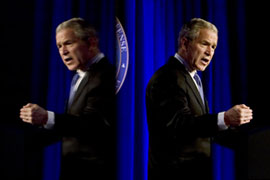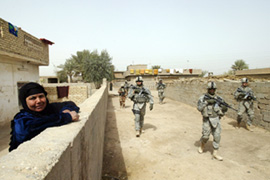Unity urged on Iraq war anniversary
Iraqi president calls for “real reconciliation” between sectarian groups.

But so far, the war has killed more than 4,000 US and allied soldiers and tens of thousands of Iraqi civilians.
Between 104,000 and 223,000 died between March 2003 and June 2006 alone, according to the World Health Organisation.
| Your Views |
Iraq‘s parliament has so far been paralysed by competition between parties driven by sectarian interests, and a previous provincial vote in 2005 was boycotted by Sunni Muslims.
“Reconstruction and the building of services and culture cannot be achieved in the shadow of economic corruption, manipulation and the placement of dishonest people in sensitive places,” Nuri al-Maliki said in a speech in Hillah, capital of Babil province.
| In Focus |
|
|
“They should have more dialogue among themselves because time is short,” Steffan De Mistura said.
 |
| Bush asserted his view that the war in Iraq is necessary and worthwhile [AFP] |
“The gains we’ve made are fragile and irreversible, but on this anniversary, the American people should know that since the surge began, the level of violence is significantly down, civilian deaths are down, sectarian killings are down,” Bush said.
“The surge is working and as a return of the success in Iraq we have begun bringing some of our troops home.”
However, he said that US troop withdrawals from Iraq above those already agreed “must not jeopardise” what he called recent improvements in security there.
The war, which is estimated to have already cost the US more than $400bn, has plunged the country into chaos.
Bush faces continued criticism for his administration’s strategy on the war, with even General David Petraeus, the commander of US forces in Iraq, telling CNN that “progress is tenuous” in Iraq.
Iraqis and US forces are attacked on a daily basis by armed groups, while fighting between Sunni and Shia factions has continued unabated.
Some progress
Despite continuing security problems, there has been progress towards peace in large areas of southern and central Iraq, where the situation is far less violent than it was a year ago.
| In video | |
|
|
An increase in US forces, which over the past year raised the level of troops to more than 160,000, has helped reduce the violence.
Tens of thousands of Sunni former armed groups have also been recruited to fight al-Qaeda.
At the same time, Muqtada al-Sadr, the Shia leader, has ordered his powerful Mahdi Army militia to refrain from attacks on Iraqi civilians and security forces.
Armed groups, however, continue to carry out spectacular attacks.
“Certainly there is an effect from the surge, and the US military figures show that attacks are down,” James Bays, Al Jazeera’s correspondent in Iraq, said on Wednesday.
“But they show that attacks are down to the level of 2005. So it’s fair to say that it has gone [down] from extremely bad, but 2005 was not a peaceful time in Iraq. It’s still very very dangerous on the streets.”
Failed economy
Adding to the security concerns in Iraq, the country’s economy is in deep crisis.
 |
| US commanders say that a ‘surge’ of US troops has contributed to Iraqi security [AFP] |
Between 25 and 50 percent of the workforce are unemployed, according to government figures.
Oil exports are the country’s main source of income, but have remained a source of contention between rival political factions.
Public services like water and electricity have yet to be fully restored, despite billions of dollars having been spent on often badly managed reconstruction projects.
And government appeals for Iraqi refugees to return to help rebuild the country have been largely ignored.
Fewer than 50,000 have returned from neighbouring Jordan and Syria, while more than two million have fled.

